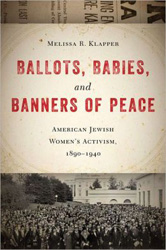Join a community of readers who are committed to Jewish stories
Sign up for JBC’s Nu Reads, a curated selection of Jewish books delivered straight to your door!
Earlier this week, Melissa R. Klapper wrote about 5 American Jewish women you’ve (probably) never heard of. She will be blogging here all week for Jewish Book Council and MyJewishLearning.
 I recently came across a copy of the June 28 issue of The Jewish Press. The Jewish Press is an Orthodox Jewish weekly periodical out of Brooklyn that has a political agenda with which I could not disagree more. When I saw the headline “Time for the Halachic View on Abortion to Be Heard,” I groaned inwardly and prepared to be outraged. Imagine my surprise when the article, by Yori Yanover, the senior internet editor of the publication, turned out to be a call to traditional halachic voices to distance themselves from Christian anti-abortion activism and to express more forcefully in the public arena the nuanced rabbinical approach to the difficult topic of abortion. While I do not at all appreciate Yanover’s description of both liberal Jewish groups and evangelical Christians as “the crazies,” I think it is extremely important that a publication like The Jewish Press is reminding its audience that even the strictest interpreters of Jewish law consistently approached abortion from the perspective of protecting the viable life of the mother over the potential life of the fetus. The rabbis, Yanover points out, historically did not consider abortion to be murder.
I recently came across a copy of the June 28 issue of The Jewish Press. The Jewish Press is an Orthodox Jewish weekly periodical out of Brooklyn that has a political agenda with which I could not disagree more. When I saw the headline “Time for the Halachic View on Abortion to Be Heard,” I groaned inwardly and prepared to be outraged. Imagine my surprise when the article, by Yori Yanover, the senior internet editor of the publication, turned out to be a call to traditional halachic voices to distance themselves from Christian anti-abortion activism and to express more forcefully in the public arena the nuanced rabbinical approach to the difficult topic of abortion. While I do not at all appreciate Yanover’s description of both liberal Jewish groups and evangelical Christians as “the crazies,” I think it is extremely important that a publication like The Jewish Press is reminding its audience that even the strictest interpreters of Jewish law consistently approached abortion from the perspective of protecting the viable life of the mother over the potential life of the fetus. The rabbis, Yanover points out, historically did not consider abortion to be murder.
Just to be clear, traditional rabbinic rulings neither condone nor promote abortion. Yanover cites the 1990 Rabbinical Council of America statement that abortion should not be an option except in “extreme circumstances and in consultation with proper Halachic authority,” but he gives equal space to the part of the same statement that rejects endorsement of legislation that would prevent abortion in those cases. Given the greater rights of the living human being – the mother – Jewish law would even allow late term abortions if the fetus poses a mortal danger to her.
This article caught my eye not only because of its source but also because of the questions that persistently came my way when I was writing my recently published book Ballots, Babies, and Banners of Peace: American Jewish Women’s Activism, 1890 – 1940 (NYU Press, 2013). The book includes two chapters on the history of American Jewish women’s involvement in the early birth control movement. I have repeatedly been asked what the “Jewish position” on contraception was during the early 20th century. Naturally, there was no single position. All of the denominations struggled to formulate a response. The Reform movement’s Central Conference of American Rabbis turned down an invitation by the Catholic church to issue a joint statement of blanket condemnation but did not officially endorse birth control for some years after beginning to discuss the issue. The Conservative movement’s Rabbinical Assembly followed suit shortly thereafter. And the Orthodox Union preserved a telling silence, officially neither approving or disapproving of contraceptive practices that the organization saw as best left to individuals making decisions in consultation with rabbinic authorities. There is plenty of latitude within halacha for birth control, which apparently comes as a surprise to those who want to see all religious people of all faiths as equally fundamentalist. I find myself agreeing with Yanover that extremists on both the right and the left could learn something from the history of Jewish institutional and legal responses to the complexities of the intersections of reproductive rights and religion.
Check back all week for more from Melissa R. Klapper.Melissa R. Klapper is a professor of history at Rowan University in Glassboro, NJ. Her newest book, Ballots, Babies, and Banners of Peace American Jewish Women’s Activism, 1890 – 1940 (NYU Press), is now available.